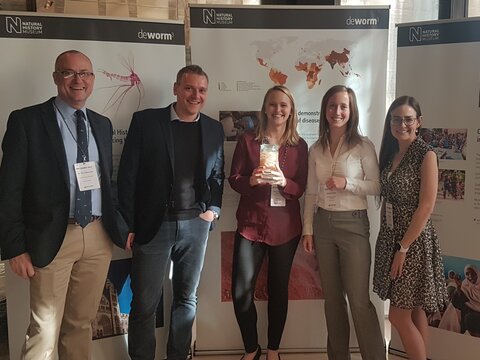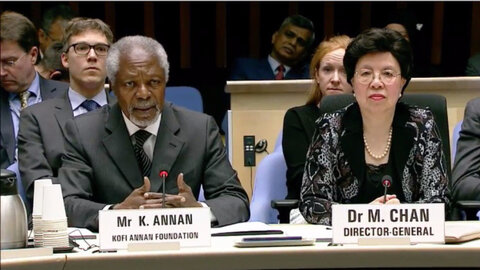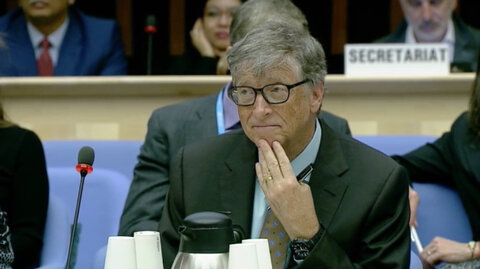Key announcements from NTD Summit 2017

Article by Dr Anouk Gouvras, Natural History Museum
On Easter Sunday the British Government announced that it would be investing an additional £450million to support the global effort to control and eliminate Neglected Tropical Diseases (NTDs). This announcement marked the beginning of Neglected Tropical Disease summit, one of the largest NTD meetings ever held.
Convened by the World Health Organisation in Geneva to mark the launch of the 4th WHO report on Neglected Tropical Diseases, the Summit provided a platform for partners to discuss how the global community can control and ultimately eliminate diseases which harm over 1.4billion people.
As important players in the global effort to control and eliminate these debilitating diseases, the Natural History Museum together with its LCNTDR partners from Imperial College London, London School of Hygiene & Tropical Medicine and the Royal Veterinary College have been following the meeting closely.
The NHM has had a long history of researching NTDs, particularly those caused by worm infections and/or transmitted by insects. Today the NHM hosts DeWorm3, funded by the Bill and Melinda Gates Foundation, a major project researching the control and elimination of soil-transmitted helminths, aka intestinal worms. Intestinal worms are the most common of NTDs.
Researchers from across the LCNTDR membership travelled to Geneva for the NTD summit and report on the meeting:

The WHO meeting was an inspiring review of the immense progress made in tackling NTDs since the WHO published it’s roadmap for NTD control and elimination in 2012. But most importantly it was a call for continued global commitment to control and eliminate these diseases that affect over 1 billion people living in the poorest and most under-served communities. Neglected diseases are most often the diseases of neglected populations.
WHO director general Margaret Chan started by stating that there is no better opportunity for ending poverty by 2030 than by combatting NTDs. This was further highlighted by Kofi Annan who explained that the SDGs (Sustainable Development Goals) cannot be achieved if we leave one billion people (those infected with NTDs) behind.
As a relatively new yet already major WHO collaborating charity focusing on NTDs, Bill Gates highlighted the need for increased mapping, data sharing and quality of preventative chemotherapy, on behalf of the Bill & Melinda Gates Foundation. He further emphasised the need for a broader range of investors in order to attain the goal of reaching 90% of affected people by 2030. Preventative chemotherapy (also called Mass Drug Administration, MDA) is applied where communities are affected by specified infection rates in order to reduce, or ideally eliminate, infection.

We also heard a passionate and inspiring speech from the Japanese Ambassador H.E.M Shino on the link between NTDs and human rights: “ health is the most essential pillar to human welfare”, “no disease and no human right should be neglected”.
The Guinea worm eradication progamme, started by President Jimmy Carter and the Carter Centre in 1986 was hailed as a huge success as the number of infections have decreased from over 3.5 million at the start of the programme to 25 cases in 2016. As a final push to eradicate this infection is implemented, with collaborative support form other government and non-government organisations, dracunculiasis, the disease caused by Guinea worm infections, is set to be the second disease to be eradicated after small pox and the first parasitic disease to be eradicated! The final push is acknowledged to be the hardest but the commitment by the various players at the WHO meeting was loud and clear!
The meeting introduced many new announcements of commitments of drug donations by pharmaceutical companies. To name a few: Eisai committed to supply treatments for lymphatic filariasis (LF) until the programme reaches elimination. Merk committed praziquantel for all school-aged children, and the role out of a special paediatric formulation for infants within the next couple of months! GSK also committed deworming drugs for the control for parasitic worm infections. Margaret Chan shared the news of a new Guinness World Record: in one day in January 2017 207 million free drug treatments were donated!
And there were no less than 5 major funding commitments:
- 360 million pounds from DFID UK to eradicate Guinea worm disease (Dracunculiasis), tackle Trachoma and lymphatic filariasis elimination and control visceral leishmaniasis, as well as support new drugs and diagnostics for other NTDs,
- 350 million dollars from the Bill and Melinda Gates Foundation over the next 4 years,
- 25 million euros from Belgium development Agency to support elimination of sleeping sickness,
- 100 million dollars from the MacArthur Foundation to support the Carter Centre in eliminating river blindness (onchocerciasis) from Nigeria,
- and a massive commitment from EMS to eliminate Yaws from Brazil in 3 years!
Because NTDs blight poor and underserved communities, the 4th WHO report on NTDs proposes to use NTD control integration into national and local health systems as a ‘litmus test’ to measure the progress towards universal health access, the major aim of the Sustainable Development Goals on health.
Organised by Uniting to Combat Neglected Tropical Diseases the NTD Summit 2017 continued with focussed presentations and sessions on progress and challenges ahead.
The NHM and DeWorm3 together with our LCNTDR partners are thrilled to be part of this international, collaborative effort to control and eliminate these debilitating and damaging neglected tropical diseases.
This article is adapted from a blog posted on the NHM website.